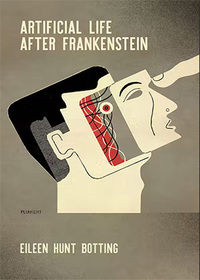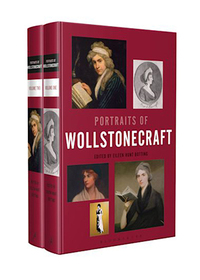
- University of Notre Dame
- Professor of Political Science
- Residential Fellow (2019-2020)
- “Three Political Science Fictions: Apocalypse, Nature, and Lovelessness”
Eileen M. Hunt is Professor of Political Science, a Fellow of the Nanovic Institute for European Studies and the Kroc Institute for International Peace Studies, and Concurrent Faculty in Gender Studies at the University of Notre Dame. She will complete two books while a Distinguished Fellow of the NDIAS: Mary Shelley and the Politics of Making Artificial Life: Political Science Fictions after “Frankenstein” and Portraits of Wollstonecraft.
She is the author or editor of seven books, including Family Feuds: Wollstonecraft, Burke, and Rousseau on the Transformation of the Family (SUNY, 2006), Feminist Interpretations of Alexis de Tocqueville (Penn State, 2009, co-edited with Jill Locke), the first scholarly edition of Reminiscences and Traditions of Boston by Hannah Mather Crocker (NEHGS, 2011, co-edited with Sarah L. Houser), a scholarly edition of A Vindication of the Rights of Woman by Mary Wollstonecraft (Yale, 2014), Wollstonecraft, Mill, and Women’s Human Rights (Yale, 2016), Mary Shelley and the Rights of the Child: Political Philosophy in “Frankenstein” (Penn, 2017), and The Wollstonecraftian Mind (Routledge, forthcoming 2019, and co-edited with Sandrine Bergès and Alan Coffee). She has also authored over fifty articles, chapters, essays, and reviews, in venues such as Aeon Magazine, The Washington Post, Political Theory, History of European Ideas, The American Political Science Review, and Reproductive Ethics II.
She was a recipient of an American Council of Learned Societies fellowship in 2015-2016 and the New England Research Fellowship Consortium’s Colonial Society award in 2009-2010. She is currently a president-elect of the Women and Politics research section of the American Political Science Association. She was elected a fellow of the Massachusetts Historical Society in 2014 and a non-resident member of the Colonial Society of Massachusetts in 2012. With Sarah L. Houser, she won the triennial Edition Award from the Society for the Study of American Women Writers in 2011. In 2014, she won the Okin-Young award from the American Political Science Association for the best article published in feminist political theory during the previous year. She is a member of the 1993 class of Marshall Scholars and an alumna of Bowdoin, Cambridge, and Yale.
Publications
-
Artificial Life After Frankenstein
University of Pennsylvania Press, 2020

What are the obligations of humanity to the artificial creatures we make? And what are the corresponding rights of those creatures, whether they are learning machines or genetically modified organisms? In seeking ways to respond to these questions, so vital for our age of genetic engineering and artificial intelligence, we would do well to turn to the capacious mind and imaginative genius of Mary Wollstonecraft Shelley (1797-1851). Shelley’s novels Frankenstein; or, The Modern Prometheus (1818) and The Last Man (1826) precipitated a modern political strain of science fiction concerned with the ethical dilemmas that arise when we make artificial life—and make life artificial—through science, technology, and other forms of cultural change.
In Artificial Life After Frankenstein, Eileen Hunt Botting puts Shelley and several classics of modern political science fiction into dialogue with contemporary political science and philosophy, in order to challenge some of the apocalyptic fears at the fore of twenty-first-century political thought on AI and genetic engineering. Focusing on the prevailing myths that artificial forms of life will end the world, destroy nature, and extinguish love, Botting shows how Shelley modeled ways to break down and transform the meanings of apocalypse, nature, and love in the face of widespread and deep-seated fear about the power of technology and artifice to undermine the possibility of humanity, community, and life itself.
Through their explorations of these themes, Mary Shelley and authors of modern political science fiction from H. G. Wells to Nnedi Okorafor have paved the way for a techno-political philosophy of living with the artifice of humanity in all of its complexity. In Artificial Life After Frankenstein, Botting brings the insights born of Shelley’s legacy to bear upon the ethics and politics of making artificial life and intelligence in the twenty-first century.
-
Portraits of Wollstonecraft
Bloomsbury, 2021

Mary Wollstonecraft’s watershed contribution to theories of women’s human rights and her international reception by both Western and non-Western intellectuals has ensured she continues to shape contemporary human rights debates around the world. Bringing together over 100 individual responses to Wollstonecraft’s life and work, Portraits of Wollstonecraft documents her international and cross-cultural reception from the late 18th-century to the early 21st-century.
Reflecting on over two centuries of responses to her political ideas, writing, and philosophy, it counters the persistent myth that she ceased to be read in the aftermath of the publication of her husband William Godwin’s scandalous posthumous Memoirs of her life in 1798. Beginning with her earliest portraiture and the first reviews of her published writings from the late 1780s, Volume I traces her emergence as an international public figure of women’s rights in her life, work, and philosophical, literary, and artistic reception throughout Britain, Ireland, Continental Europe, North and South America, and across the British Empire and its former colonies from Jamaica to India to South Africa. Volume II focuses on Wollstonecraft’s posthumous philosophical, literary, and artistic reception, especially within modern strands of feminism, by assembling responses from China, Japan, and South Korea as well as writing by Mary Shelley, Emma Goldman, Ruth Benedict, Virginia Woolf, Simone de Beauvoir, Betty Friedan, Susan Moller Okin, Barbara Johnson, Martha Nussbaum, and Amartya Sen that discusses her theories of virtue, love, gender, education, and rights.
Bringing to light many forgotten accounts and images of Wollstonecraft, pieces by major thinkers from across the history of philosophy, and 31 annotated illustrations showing her development into a feminist icon, Portraits of Wollstonecraft achieves what no other work on Wollstonecraft has yet to do. This comprehensive collection charts the depth and breadth of her legacies for philosophy, political theory, ethics, literature, art, and feminism on a global scale.